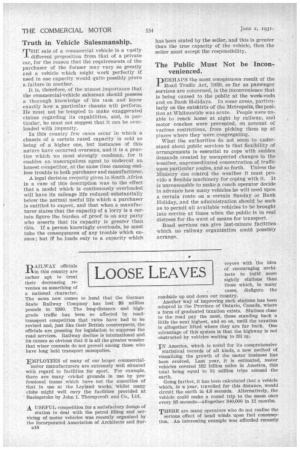The Public Must Not be Inconvenienced.
Page 36

If you've noticed an error in this article please click here to report it so we can fix it.
nERHAPS the most conspicuous -result of the Road Traffic Act, 1930, so far as passenger services are concerned, is the inconvenience that is being caused to the public at the week-ends and on Bank Holidays, in some areas, particularly on the outskirts of the Metropolis, the posi-. tion at Whitsuntide was acute. People were un-, able to reach home at night by railway, and motor coaches were prevented, on account of various restrictions, from picking them up at places where they were congregating. What the authorities do not seem to understand about public services is that flexibility of arrangements is essential to cope with sudden demands created by unexpected changes in the weather, unpremeditated concentration of traffic upon particular routes, and so forth. Unless the Ministry can cdntrol the weather it must provide a flexible machinery for coping with it. It is unreasonable to make a coach operator decide in advance how many vehicles he will need upon a certain route on acertain Sunday or Bank Holiday, and the administration should be such as to permit all available vehicles to be brought into service at times when the public is in real distress for the want of means for transport.
Road services can give last-minute facilities which no railway organization could possibly arrange.




































































































